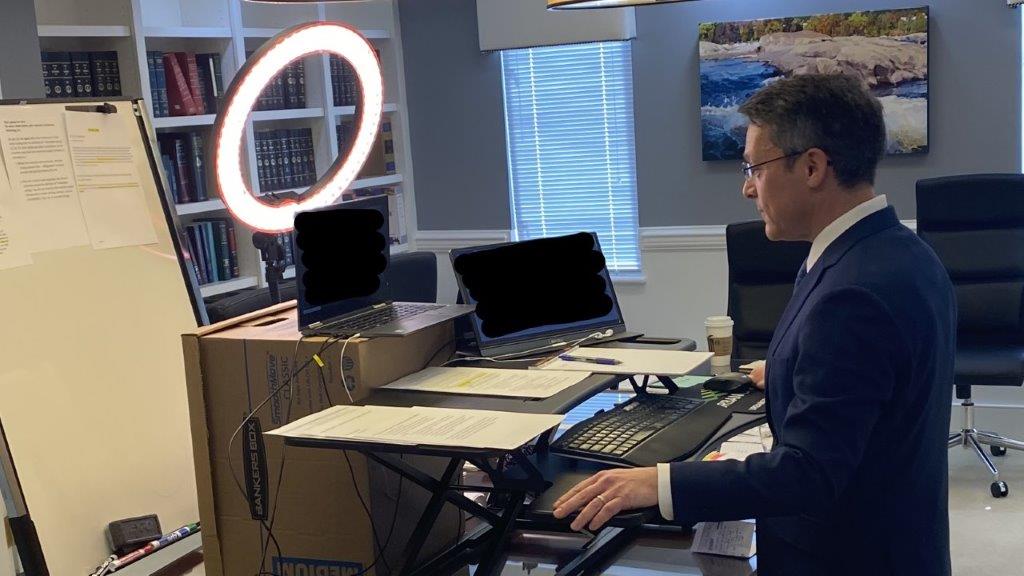
I recently blogged about a case in which the Virginia Supreme Court ruled in my client’s favor. Numerous people reached out to me, many of them asking what it was like to do a virtual argument before the Court. Well, let me tell you about it….
Even though it was virtual, I can now cross “arguing before the Supreme Court of Virginia” off my bucket list.
I had a feeling the case would get appealed as soon as the State Corporation Commission ruled in my client’s favor. The issues were too interesting, too “statutory,” too much at stake for both sides.
We wrote our appellant’s brief and coordinated with the Commission’s lawyers on dividing the appellees’ oral argument equally – 7.5 minutes each.
We received word that it would be a virtual argument. Kind of disappointing because I’d always envisioned standing at the lectern, butterflies in my stomach, and launching into “May It Please the Court…” But I had to think of it as every bit the same as an in-person argument.
I decided that the only way to do this correctly was to go all-in. We took over the big conference room in our office. We ordered a ring light. They leave it up to you whether you want to sit or stand during your argument. I wanted to stand, so I ordered a standing desk.
I blocked off as much of my calendar as I could for a week. I spent days in the conference room reading and re-reading the record, the briefs, and every case cited. I talked aloud about the cases to make sure I could explain them in a few sentences without hesitating. I wrote out my intro in humongous font and taped it to an easel on the other side of the computer. I did the same thing with the statute we were arguing about so I would not lose focus.
We mooted the argument on three different occasions, about two hours each. We kept some of the same “justices” and mixed in new ones. My wife, who clerked for Justice Keenan and who has argued several times before the VSC and the Court of Appeals, was undoubtedly the toughest questioner. Her questions, my responses, and our evaluations continued through dinner. By Argument Day, our 15-yr old son knew the case as well as anyone!
Argument Day was interesting. They keep you in a “virtual holding room” where you remain until the Court calls your case. There were three cases before mine. You cannot see the other arguments. You can listen to the live stream on the internet, but they encourage you not to because of the feedback. It’s definitely different from sitting in the audience before your case is called.
My parents were listening to the live stream on the internet. I know this because my dad called me on my cell about two minutes before the Court called our case to let me know that his live stream went down and could I help him fix it. I will forever pat myself on the back for calmly asking him if he’d mistakenly muted his speaker volume. He had. Crisis averted.
One of the challenges is trying to figure out whether and how to adjust your argument based on what the appellant’s lawyer says. It didn’t matter for me because I hadn’t finished my intro before the questions started. Two justices asked me several questions, the first of which was a question we had not anticipated in our moot sessions. I muddled through it, but it was not a glorious start to my appellate career. Fortunately, I felt good about my answers to the other questions, all of which we’d practiced, and I was able to explain the points I had wanted to coming in.
And after 7.5 quick, intense minutes, it’s over. I listened to the recording a few days later. Usually, I cringe at the sound of my voice and kick myself for all the things I could have said better. This time, though, I was proud of the effort and comfortable with the performance. The rest was out of my hands.
We got a great result – affirmed – but the point of this post is not about the result of the case. I’m elated I was able to argue before the VSC and cross that off my list. I’m equally happy, if not more so, that I can look back on it and feel great about the planning and the preparation. And I’m very thankful that our group here at GreeneHurlocker threw itself into helping me, that my family really got into it, and that I was able to represent my client as best I could.
And even though I argued from a conference room, I still stood at a lectern with butterflies flying as I said “May It Please the Court….” But I did wear sneakers.
Brian Greene represented Constellation NewEnergy in the case of VEPCO v. SCC. You can read the Court’s Opinion here and Brian’s summary here. For more information on this case and other issues impacting the retail energy and renewable energy industries, please contact Brian or any of GreeneHurlocker’s energy attorneys.



Sorry, the comment form is closed at this time.